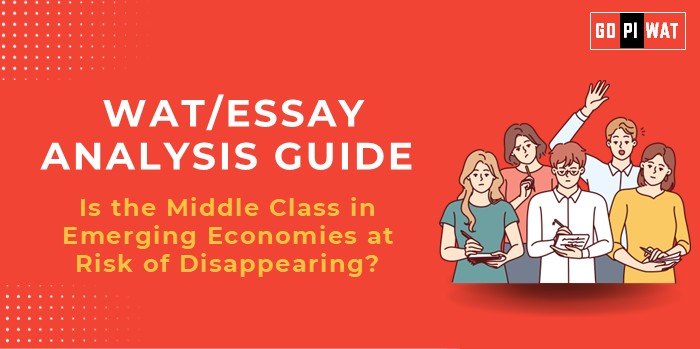📋 Written Ability Test (WAT)/Essay Analysis Guide
Topic: Is the Middle Class in Emerging Economies at Risk of Disappearing?
🌟 Understanding the Topic’s Importance
The middle class plays a crucial role in driving economic growth, fostering social mobility, and maintaining political stability in emerging economies. However, challenges like inflation, automation, and inequality threaten its survival. This topic encourages students to explore the intersection of economic theory, policy-making, and real-world implications.
⏱️ Effective Planning and Writing
- Time Allocation:
- 📝 Planning: 6 minutes
- ✍️ Writing: 20 minutes
- 🔍 Reviewing: 4 minutes
- Preparation Tips:
- Research income trends and key drivers of middle-class erosion.
- Gather examples from emerging and developed economies for comparative analysis.
💡 Introduction Techniques
- Contrast Introduction:
“While middle-class growth fueled emerging markets’ GDP for decades, rising inflation and automation now threaten its existence.”
- Historical Context:
“From the 1990s boom to today’s economic strain, the middle class in emerging economies has faced an evolving landscape.”
📊 Structuring the Essay Body
🏆 Achievements
- 📈 Economic Growth Driver: Middle-class households in emerging markets contribute over 40% of global GDP growth (source: World Bank 2024).
- 📚 Social Mobility: Access to better education and healthcare has elevated millions out of poverty.
- 🛍️ Consumption Power: A growing middle class drives demand for goods and services, fueling local industries and global trade.
⚠️ Challenges
- 📉 Wage Stagnation: Wage growth has lagged behind inflation in major emerging markets, reducing real purchasing power.
- 🤖 Automation Threats: Emerging economies risk losing 20% of low and mid-skill jobs to automation by 2030 (WEF).
- ⚖️ Economic Inequality: Urban-rural disparities persist, leaving a significant portion of the middle class vulnerable to economic shocks.
🚀 Future Outlook
- 🎓 Enhancing Skill Development: Governments should promote training programs aligned with the evolving job market, focusing on digital and automation-resistant skills.
- 🛡️ Expanding Social Safety Nets: Introduce stronger unemployment benefits and healthcare subsidies to support middle-class households during economic downturns.
- 💰 Improving Access to Affordable Finance: Expand microcredit and low-interest loans to middle-class entrepreneurs to foster innovation and economic participation.
- 🌍 Promoting Inclusive Policies: Governments should ensure equitable growth by reducing urban-rural disparities through targeted infrastructure investments.
📄 Concluding Effectively
- Balanced Conclusion:
“The middle class in emerging economies stands at a crossroads. While risks loom, targeted interventions can secure its future.”
- Future-Focused Conclusion:
“Ensuring the middle class’s survival will require global collaboration, technology-driven reforms, and inclusive policies.”
✍️ Sample Short Essays
- Balanced Perspective:
“The middle class in emerging economies is shrinking due to economic and technological pressures. While challenges exist, opportunities for growth through education and innovation remain untapped.”
- Solution-Oriented:
“A combination of robust policy frameworks and private sector collaboration can revive the middle class in emerging economies, driving sustainable growth.”
- Global Comparison:
“Emerging economies must emulate China’s success in growing its middle class through targeted investments and strong governance.”
🌟 Advanced Analysis for Essay Writing
Analyzing Successes and Shortcomings
Key Achievements:
- 📊 Middle-class households drive over 40% of global GDP growth (World Bank 2024).
- 📚 Social mobility advancements in education and healthcare.
- 🛒 Consumption power fuels local industries and global trade.
Ongoing Challenges:
- 📉 Wage stagnation in major emerging markets.
- 🤖 Threat of automation eliminating low and mid-skill jobs.
- ⚖️ Persistent urban-rural economic disparities.
Global Context:
- 🌟 China: Targeted investments and urbanization pulled millions into the middle class.
- 🌎 Latin America: Inflation and political instability caused middle-class contraction.
Recommendations for Sustainable Progress
- 🎓 Enhance skill development to align with future job markets.
- 🛡️ Expand social safety nets for economic resilience.
- 💰 Improve access to affordable finance for middle-class entrepreneurs.
- 🌍 Promote inclusive policies to bridge urban-rural disparities.
🏫 Further B-School Applications
- 📘 Real-World Application Areas: Finance, operations, and public policy.
- 🎓 Sample Interview Questions:
- How does automation impact middle-class job stability in emerging economies?
- Can income redistribution policies effectively address the shrinking middle class? Provide examples.
- What role does the private sector play in sustaining the middle class?
📚 Enhancing Engagement and Utility
- 💡 Include thought-provoking discussion points, such as the prioritization of digital skill development over traditional education.
- 📜 Use case studies like Kerala, India, and Estonia’s digital economy as examples of progressive policies and resilience strategies.


